
This page is one small part of Good Sites for Kids!
![]()
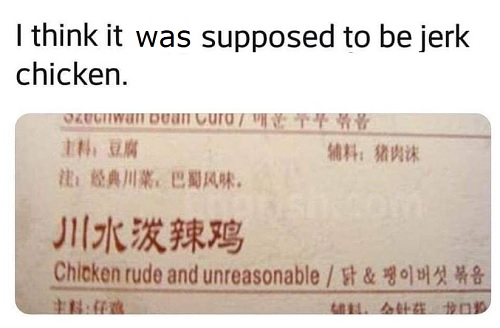
If you are trying to communicate in a foreign language,
GSFK suggests you let a native speaker edit it first.
On the other hand, this may well be an advertising coup!
12
Old Words That Survived by Getting Fossilized in Idioms
"Here are a few lucky words that have been preserved in common English
expressions."
Kith, dint, fro, eke, wend, and seven more.
14
common words and phrases you’ve probably been saying wrong this whole
time
by Kathy and Ross Petras, CNBC Contributors
This page lists 14 examples of grammatical mistakes. Right choice and wrong
choice for each is defined, compared, and contrasted, with examples for each:
“in regard to” and “in regards to” It’s “in
regard to.” Or better yet, just say
“regarding.” You can say “as regards,” or offer someone
your “best regards,”
both with the “s.” But in regard to “in regards to,”
leave that “s” off!
I had a long talk with him in regard to his request for a loan.
The teacher talked to the students in regard to their homework.
GSFK suggests substituting "about" for "in regard to" in
both
the above examples.
![]()
20 Idioms About Money from the Grammarly Blog
While these cultural phrases are easily understood by native speakers,
language learners may be tripped up by their meaning.This blog explains
why that is and provides you with 20 examples of common English
money idioms, along with their actual meaning.
To help you understand when and where to use idioms about money,
we’ve compiled a list of the most commonly used phrases, their
meaning, and examples of how to use these idioms in a sentence.
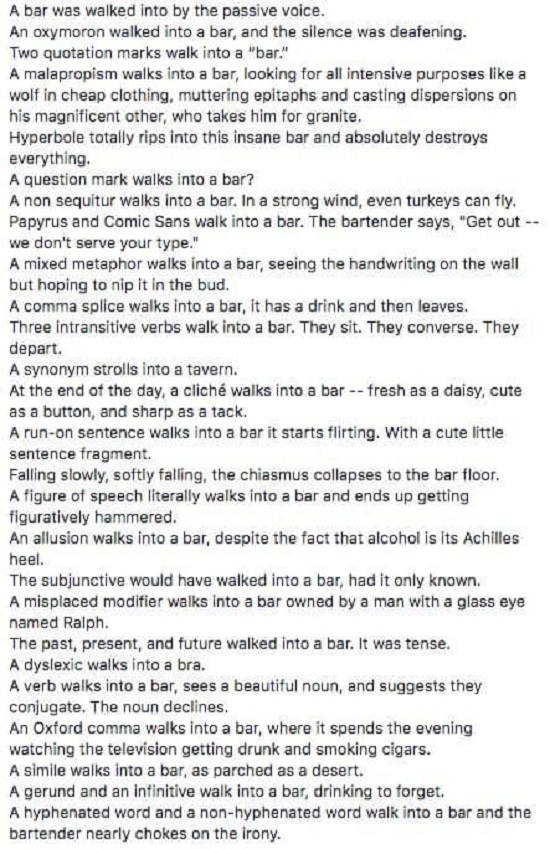
Casual Farewell Rhyming Exchanges and
Bill Haley & Comets - See You Later Alligator
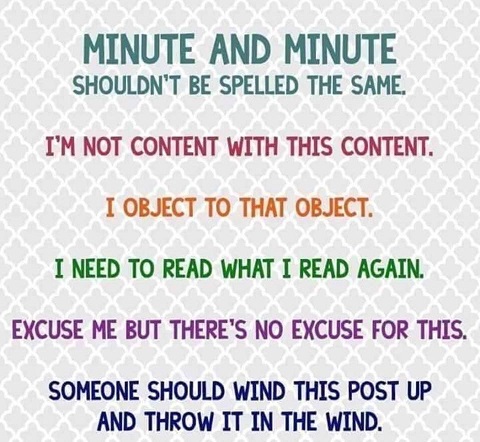
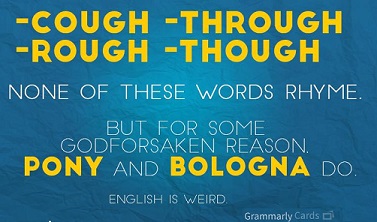
"cawf", "throo", "ruff", "thow", "pohnee",
"bah-loh-nee"
Honoring all the "old-time" grammar teachers who tried their best...
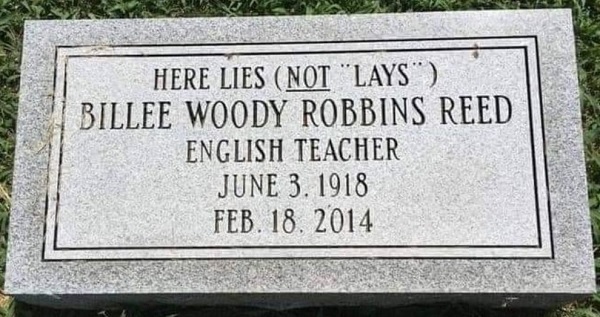
Run-on sentences can be dangerous! Use full stops/periods
where necessary! Punctuation saves lives!
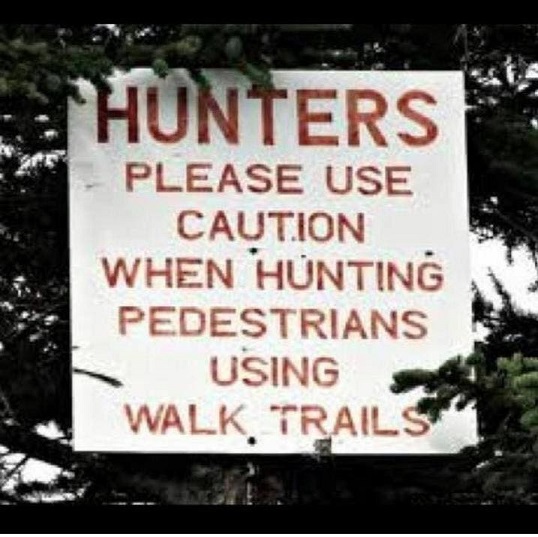
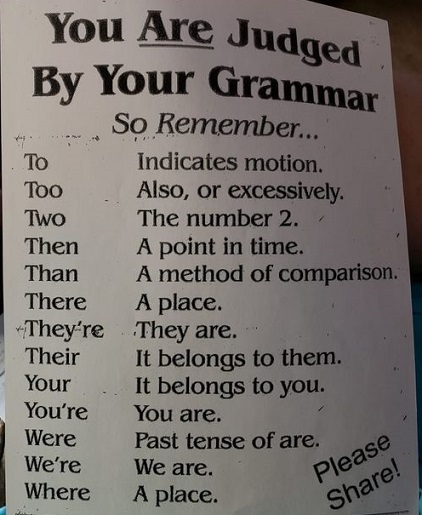
![]()
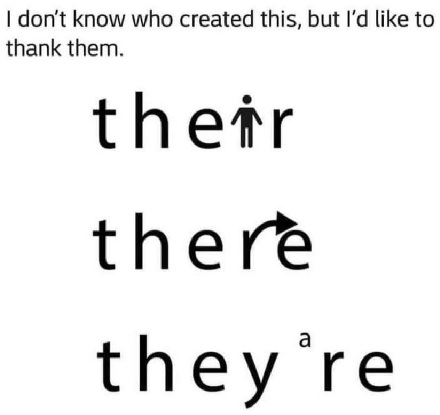
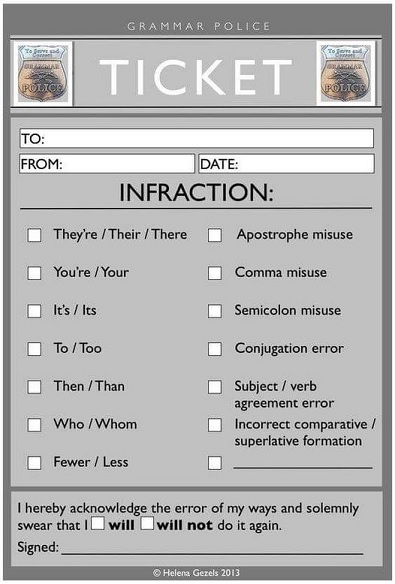
Watch out for similar sounding words that mean different things!
![]()
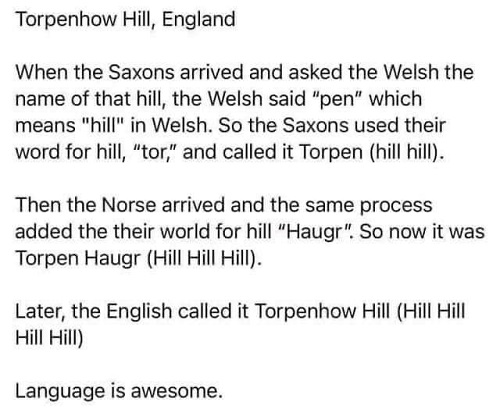
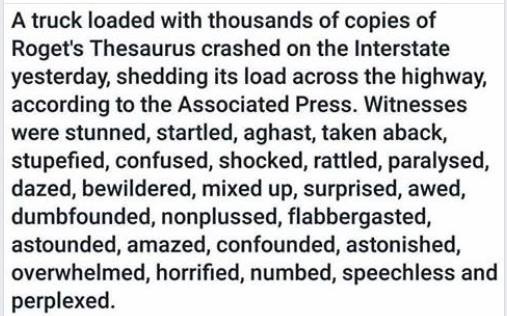
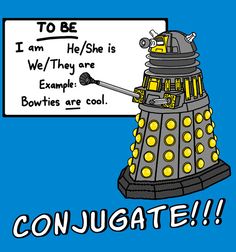
Conjugate the verb "to cut"
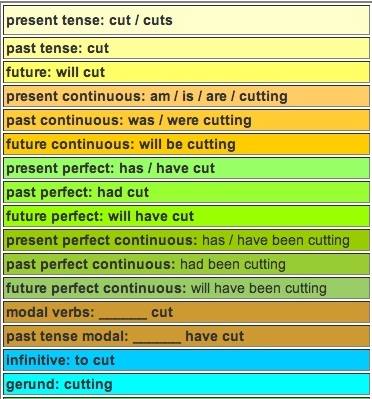
5
Verb Mistakes You Should Stop Making Today
from Grammerly. The list:
10 Tricks to Help Your Child Remember Tricky Spelling Words Basically a list of 10 memonics with explanations. Not theory, just practical ideas for you.
15 Grammar Goofs The big 15 that make teachers and employers lose it. You do not want to make these mistakes at work, let alone in school. Study this infografic! Written by Copyblogger and designed by Blue Glass.
139
Old Norse Words That Invaded The English Language "Without the Vikings,
English would be missing some awesome words like berserk, ugly, muck, skull,
knife, die, and cake!" "Traust me, þó (though)
it may seem oddi at first, we er still very líkligr
to use the same words as the Vikings did in our everyday speech. Þeirra
(their) language evolved into the modern-day Scandinavian languages, but þeir
(they) also gave English the gift of hundreds of words." For more advanced
learners, here is an article on Yorkshire
dialect*, from northeast England where the old Danelaw was.
* It's chock-full-o'-Norse!


![]()
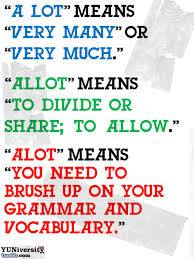
![]()
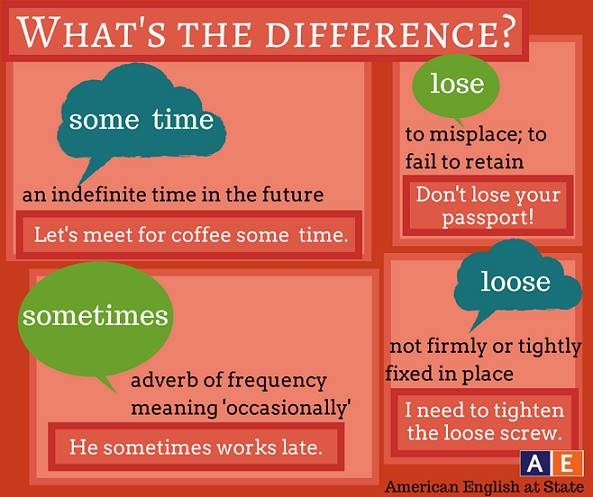
Activities for ESL Students Thousands of quizzes, tests, exercises and puzzles to help you learn English as a Second Language. A very large repository of ESL help. Teachers and native language speakers are invited to submit their own material. Tons of online quizzes on English grammar and vocabulary, plus crossword puzzles. All are ranks as Easy, Medium, or Difficult. (These could be used with children as well.) Multilingual quizzes for a whole list of languages, Arabic to Zulu! Here's a quiz on Assorted Count and Noncount Nouns from Grammar - Easy. Both ESL teachers and English teachers should find many useful things here.
Apostrophes - How To Use An Apostrophe This 4:28 video from videojug covers all the rules of when and when not to use an apostrophe! It can be watched over and over if necessary. This could be run on a projector for whole class instruction.
Apostrophes 101 This one-page summary from Language Portal of Canada covers the apostrophe rules quite well, with simple examples, and does not go all esoteric on you. Excellent job.
Ask Doctor Grammar At last! Your grammar questions answered online! From questions of common usage to the exotic, it's probably in here.
Basics of English Grammar from TalkEnglish.com A double column of 30 sections of grammar might intimidate anybody! Nonetheless adult ESL students and other adults wanting to better their English speech and writing will benefit by going all the way through this page. Classroom teachers of grammar will find sources for all sorts of lessons for kids.
Breathe
vs breath Judging from what one reads on the internet, too many people have
forgotten the difference.
Perhaps you think the two are interchangeable. They're not.
breathe = verb "breeth" long "e";
rhymes with breed, freeze, please, seethe, etc.
"I breathe, you breathe, he/she/it breathes." "She is breathing."
breath = noun "breth" short "e";
rhymes with death, Seth, breadth, etc. "Take a breath."
Click on the graphic to
see a larger version.
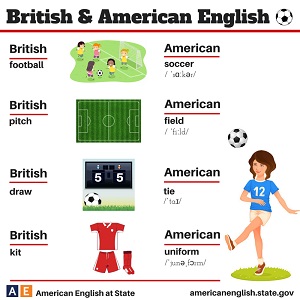
British & American English: Differences By American English at State has six big, cool, colourful graphics that explain differences in word choices. Topics covered are: clothes, automobiles/cars/motorcars, transportation, highways and roads, and vegetables.
![]()
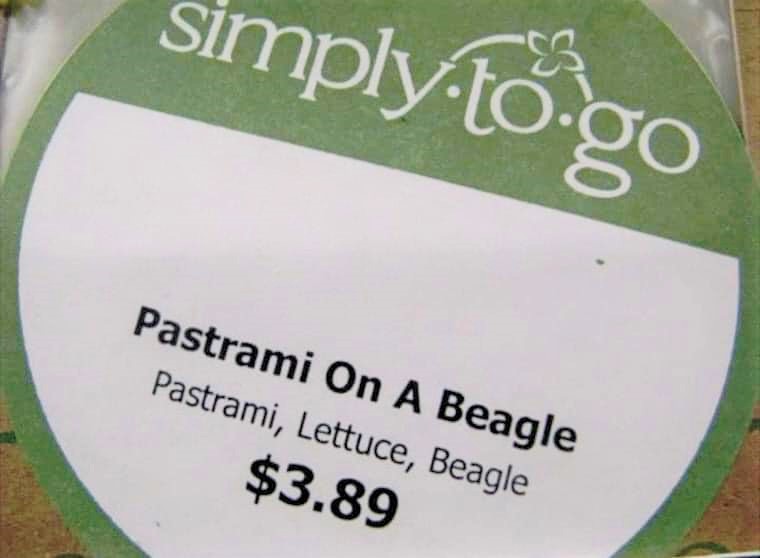
Commas! Are you using
them correctly? Avoid problems
with punctuation by reading up on grammar and style,
or asking a teacher. Improper use of commas may cause
confusion, as these (ahem) "examples" show:
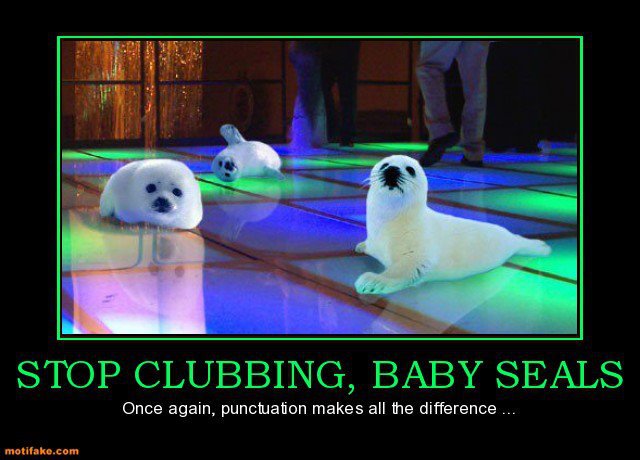

For a well-explained list of comma rules,
go to this page
from Grammar Book.com.
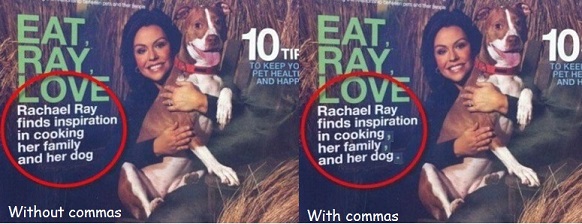
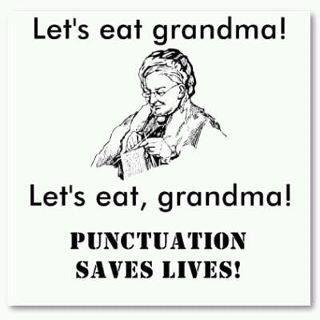
Disclaimer: OK,
seriously, if you think Rachel Ray literally
cooks people and dogs... You need help.
PS, We love all her shows and subscribe to her magazine,
so there.
We like the comma in the baby seal graphic.
If only that were the reality :(

![]()
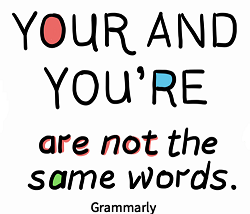
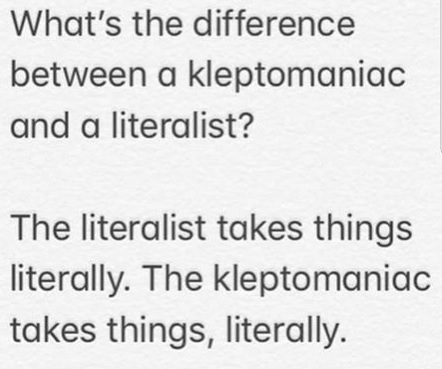
For a well-explained list of comma rules, go to this page from Grammar Book.com.
Common Errors in English Usage "The aim of this site is to help you avoid low grades, lost employment opportunities, lost business, and titters of amusement at the way you write or speak." You should read over the intro page at least once before going on to the list of errors. The errors list page is alphabetized and very comprehensive. A very useful tool and an aid to better American English. We should all thank Professor Paul Brians of WSU Pullman.
Comparative and Superlative Adjectives from TalkEnglish.com This is a one-page intensive dose of the bare facts of the subject, with a quiz. A site for learners who want to learn the material quickly and with no nonsense. Part of a larger site designed for ESL, but very useful for younger students as well.
![]()
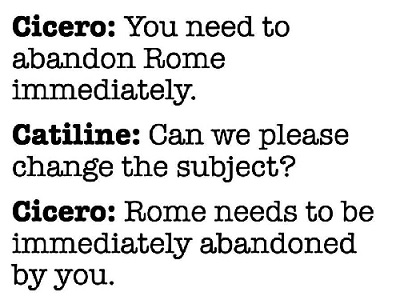
 Conditional
Verbs "Could have"
Conditional
Verbs "Could have"
Could, would and should are helping verbs.
"To have" is an action verb.
"Could've" is a conditional past tense of "have". 've = have
Could've sounds like "could of" if it's said fast. "Coulda" is saying it really fast.
People who do not read much often have trouble spelling words they've never read, but only heard.
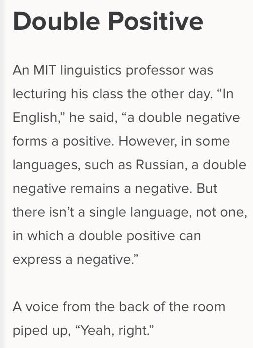
This is a classic example of the vagarities of our native tongue,
and a cautionary tale about grammatic rules vs common English usage.
Diagramming
Sentences Once upon a time, all grade school students were taught this.
Like Latin, it's coming back into style in the educational community. Benefits
include a better
understanding of sentence structure, better parsing, better writing, and better
public speaking.
This
page has a decent Power Point about diagramming.
Do
You Know More Grammar than a Fifth-Grader?
" Will your elementary school English teacher
be impressed with your grammar knowledge? Take this quiz and find out whether
you're a true grammar Nazi."
A 40 question test ranges widely among parts of speech, spelling, punctuation,
and everything else; the more
obscure the better. You may find yourself digging through grammar texts to find
the true, unknown answer.
ESL/TOEFL pages
from from the British Council and the BBC. Excellent source for plans
and ideas for
teaching English as a foreign/second/new language. Good source for grammar basics,
too.
EFL/ESL
Games for Kids Online Free Interactive from TurtleDairy.
"Our interactive EFL/ESL
games and online activities teach kids letter recognition and writing in an
easy, comprehensive
manner. Preschoolers are introduced to phonics and rhyming words which help
in early reading
and writing skills. For more mature learners, we offer a wide range of vocabulary
and grammar
exercises." 13 pre-K, 27 K, 20 1st grade,
and 18 2nd grade games.
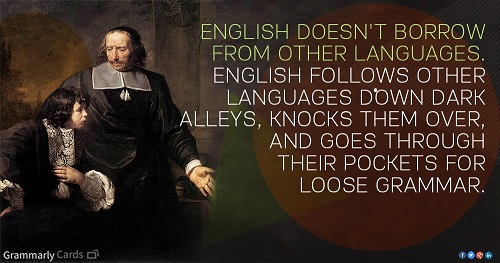
English for early years These are lessons in letter sounds/phonemes and sentence structure (how to make a sentence show sequence of events.) Downloadable zip files that make folders containing the lesson, which will then start your browser. Interactive Flash lessons that use your browser. From Education Services Australia and Curriki.
English
listening exercise from Multimedia-English,
a big site dedicated to ESL. "Learn real English, prepare for real life."
"Here is an English listening exercise based on a story about rules in
school.
Before the exercise starts, you will learn some new English vocabalury.
You will then listen to the article and write your answers to the questions."
The whole site is full of instructional videos,
lessons (like the listening exercise above), music
(hone your English fluency by listening to pop music), Basic
Real English for primary kids and absolute beginners, and "Kids"
(363 short videos sipped from kids TV shows worldwide).
englishforeveryone.org "is your resource for printable English worksheets. On the left of this page you will find an index containing hundreds of quality teaching materials...Grade school (K-12), General Educational Development (GED), English as a Second Language (ESL), should be able to benefit from this website. We offer a large variety of accurate and concise skill building resources geared towards a range of ability levels." It's all free for teachers, but they do ask that you respect their copyright (details on the front page).
![]()
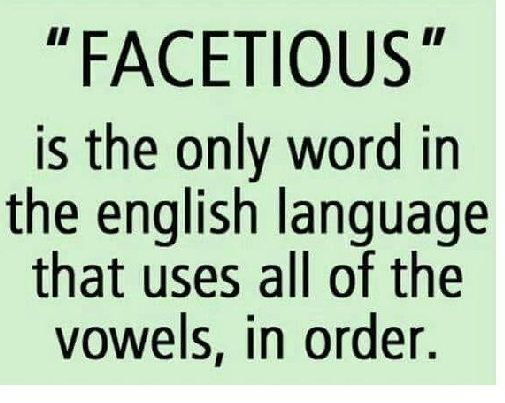
figuratively/literally
from Choose Your
Words (part of Vocabulary.com).
"Figuratively means metaphorically, and literally describes something that
actually
happened. If you say that a guitar solo literally blew your head off, your head
should
not be attached to your body." Concise explanation of the difference between
these words.
FIX YOU’RE GRAMMAR! from Glove and Boots.

A humorous short cartoon video concerning grammar and usage.
Carefully explains "there, their, they're", "loose/lose",
and a cute
lesson on "literally".
Free Language Arts Curriki Curated Resources Here are 32 (it lists 33, but #2 and #14 are duplicates) separate collections of language arts lesson plans for middle school, high school, and ESL use. Not 32 lessons but 32 groups of lessons. Some could be adapted for upper elementary. Everything from parts of speech to Shakespeare. Lesson plans, lessons ready-to-go, rubrics, worksheets, videos, and more.
Free Worksheets for Kids from K-5 Learning. This is a commercial site with a good reputation. They offer quite a bit of free material. "Our website has free resources for preschool through grade 5 kids. We have:
Visitors can also download our ebook: How to Help Your Kids Succeed in School.
Mastering these worksheets would give students a solid foundation to build on. Thanks to Joy at K-4 Learning for her email.
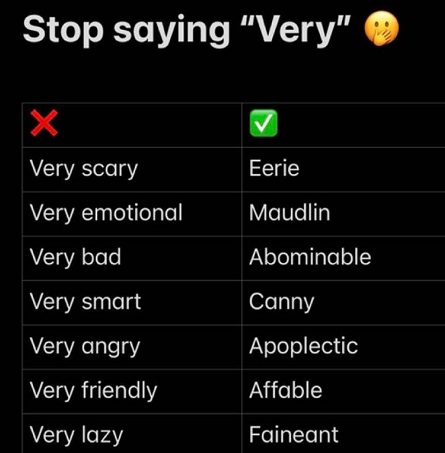
Grammar by Shmoop. "Whether you are a grammar stickler or you hate grammar sticklers, we've got you covered. Click on any of the sections below to get the lowdown on all things grammar. We'll give you loads of examples and common mistakes, and we'll let you know when you need to be on point and when you can play a little fast and loose with those pesky rules." Sounds good.
Grammar and Usage for the Non-Expert This classy site covers issues like "Where do the punctuation marks go when used with quotation marks?", "It Is Usually Not Wrong to End a Sentence with a Preposition", etc. Worth visiting and bookmarking.
Grammar from Purdue OWL (Online Writing Lab) from Perdue University. The main site covers General Writing, Research and Citation, Teaching and Tutoring, Subject-Specific Writing, Job Search Writing, and ESL. This Grammar site is from the General Writing section. The whole site is huge! Go and find out for yourself! Anyway, in Grammar you can find:
Grammar Bytes!:Grammar Instruction
with Attitude. Great YouTube videos, and interactive exercises for high school
and college grammar classes (maybe advanced 8th grade?) from a college instructor.
The latest video is 14 minutes of learning about plagiarism
("Whip lashes! Maniacal laughter! Celestial visitations!") This
impressive site includes Terms
• Exercises •
Handouts • Presentations
• Videos • Rules.
OK, so grammar isn't your idea of fun. Much like keyboarding, you need it
to get ahead in this world, and, like keyboarding, It Can Be Learned. Thanks,
Ms. Robin Simmons, for serving up one of the best upper-level grammar sites
ever! BTW this site IS copyrighted, so read the Terms of Use.
Grammar Girl Why, oh why, didn't we discover this site sooner? Grammar tips at her site or via free podcast. High school and up, very concise and accurate. She does it for a living. As one teacher's blog says: "I have added her to my itunes and get a weekly updated podcast for free. You should do the same." Listen to the audio or read the weekly tips, you'll be hooked. Thanks to Laura Mazzola and Mignon Fogarty.
Grammar Gorillas from Funbrain is a good parts of speech game. It's sad when kids make it to high school and still do not know their parts of speech, especially with classic drills like this one around.
 Grammar
Monster A monster of a site that helps cure your grammar
ills! Grammar Monster will teach you all about grammar, we mean, ALL about grammar!
Punctuation - 8 topics and 34 lessons & quizzes. Parts of speech - 8 topics
and 27 lessons & quizzes. Confused Words - a couple of dozen pairs and how
to use them correctly. A big Grammar Glossary, terms from "abbreviation"
to "zeugma" explained. Close to 100 Common Mistakes explained. A Miscellaneous
section that covers everything else, such as when to capitalize, parentheses,
"they're/there/their", singular/plural, and similar things.
Grammar
Monster A monster of a site that helps cure your grammar
ills! Grammar Monster will teach you all about grammar, we mean, ALL about grammar!
Punctuation - 8 topics and 34 lessons & quizzes. Parts of speech - 8 topics
and 27 lessons & quizzes. Confused Words - a couple of dozen pairs and how
to use them correctly. A big Grammar Glossary, terms from "abbreviation"
to "zeugma" explained. Close to 100 Common Mistakes explained. A Miscellaneous
section that covers everything else, such as when to capitalize, parentheses,
"they're/there/their", singular/plural, and similar things.
![]() "Eliminate Errors, Enhance Clarity and Meaning, Write Anywhere.
"Eliminate Errors, Enhance Clarity and Meaning, Write Anywhere.
Eliminates most writing mistakes" Free
download! "Grammarly corrects over 250 grammatical mistakes,
while also catching contextual spelling errors and poor vocabulary usage."
It really works!
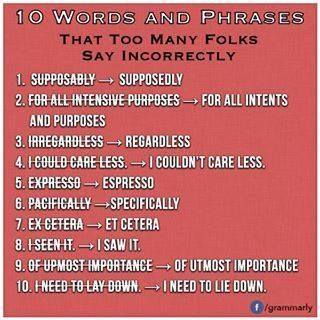
Grammatically Speaking is a grammar quiz from Staples Canada. "Whether you’re a stickler for good grammar or just curious about your punctuation prowess, test your grammar know-how with the Grammatically Speaking quiz. Use the dials to select the correct answers and then challenge your friends to beat your score." This is a pretty good on the fly assessment tool. Try it out!
Guide to Grammar and Writing from Capital Community College, Hartford, Connecticut This site is for teachers and senior high and college students. Learn ALL about grammar here. (This is an) Excellent resource.
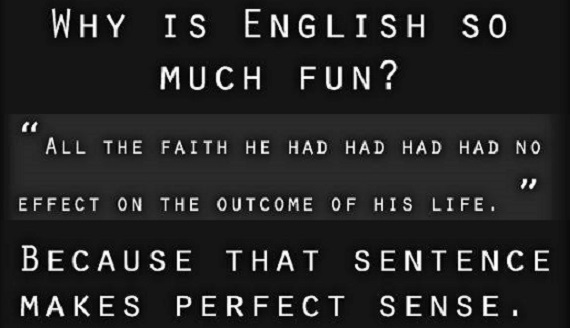
Harcourt Language Arts preview site Very good site by the Harcourt publishing people. Lots of chances for online grammar exercises here! All sections are great, but our fave is still Grammar Practice Park.
If you can correctly pronounce every word in this poem... This fairly long poem by G. Nolst Trenité, a.k.a. "Charivarius", is around 100 years old (1922). It is "designed to demonstrate the irregularity of English spelling and pronunciation." (quote is from The Poke) English is a hard language to learn, in part because of the inconsistency of pronounciations. Try this and see how well you do!
The ins and outs of using quotation marks in your writing Short half-page explains the simple rules of quotation mark use, with examples. Another time-proven way to get your quotations straight is to read good books, fiction or non-, and see how the author handles quotations. Use those examples and the rules will make more sense to you.
Semicolon,
colon, and dashes: Are you using them correctly?
From Passnownow, a Nigerian "good site".

Good explanations and examples. Plenty more grammatical advice elsewhere on
this site!
![]() Josie's
Poems It's fair to call this site "the biggest poetry
website on the internet". "...knowing how very important rhyming and
rhythmic poetry is for helping children develop phonological awareness, a key
literacy tool, I’ve just written almost 900 poems for children of all
ages." These are GOOD poems to read or to read aloud. The sort of poems
that develop language skills, because they emphasize rhyming, rhythm, the way
words sound in the head, mouth, and ear, and demonstrate the use of
parts of speech! The
haiku, cinquains, adverb poems, similes page is a shining example of how to teach
poetry structure and grammar all at once! Read Apostrophe
- Mr Blob and see what we're so happy about. There are ebooks, audios, and
videos, too, and the chance to buy books (the rest of the site is FREE). This
site is also used by ESL students in Europe. The English speaking world badly
needs this sort of place on the web - so much of what is in here is no longer
covered well (or at all) in many educational environments. A big THANK YOU to
Josie Whitehead, the teacher who created the site and most of the poems!
Josie's
Poems It's fair to call this site "the biggest poetry
website on the internet". "...knowing how very important rhyming and
rhythmic poetry is for helping children develop phonological awareness, a key
literacy tool, I’ve just written almost 900 poems for children of all
ages." These are GOOD poems to read or to read aloud. The sort of poems
that develop language skills, because they emphasize rhyming, rhythm, the way
words sound in the head, mouth, and ear, and demonstrate the use of
parts of speech! The
haiku, cinquains, adverb poems, similes page is a shining example of how to teach
poetry structure and grammar all at once! Read Apostrophe
- Mr Blob and see what we're so happy about. There are ebooks, audios, and
videos, too, and the chance to buy books (the rest of the site is FREE). This
site is also used by ESL students in Europe. The English speaking world badly
needs this sort of place on the web - so much of what is in here is no longer
covered well (or at all) in many educational environments. A big THANK YOU to
Josie Whitehead, the teacher who created the site and most of the poems!
As an old grammar teacher once said, "Men lie, hens lay."
She knew about both.
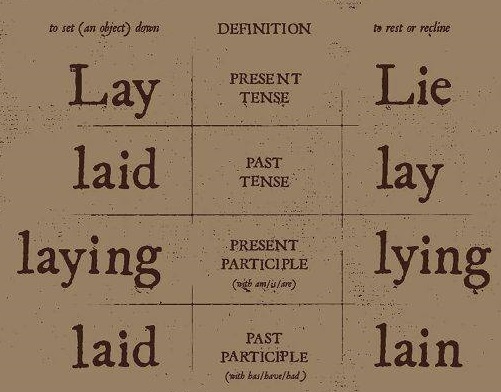
Learn English Online - Free Beginner's Course 56 lessons (more coming) in 14 Units cover pretty much everything. Designed for ESL, but a grammar teacher of native speakers could pull out specific lessons. One example: Lessons 36 - 38 cover "how much" vs "how many" (uncountable vs countable nouns), and do it very well! Exhaustive without being exhausting. Plentiful examples, self-tests, and plenty of links.
Letter Sounds Online All of Owl & Mouse's downloadable Letter Sounds games are now online and interactive! " Letter Sounds helps children make the first, vital connection between the letters of the alphabet and the sounds they represent. Children drag pictures to the letters that make the first sounds of the word that describes the picture. Voice is used to be sure that children know the right word and to reinforce the connection between the first letter and the first sound in the word. Fun, educational hands-on learning." Play the original (initial consonants & some blends) game, also long and short vowels, initial consonant blends, and "s" blends!
Be aware these words have
differing shades of meaning
and different degrees of intensity.
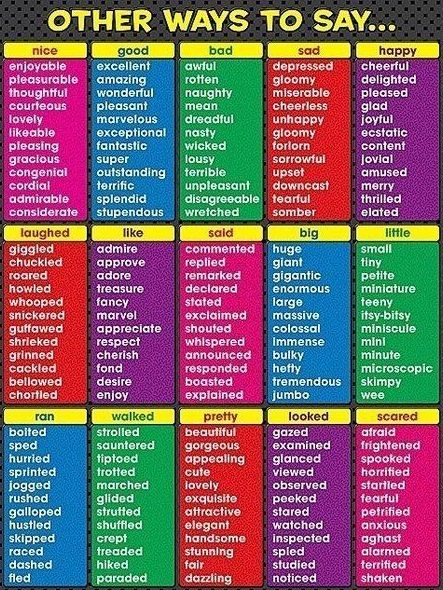
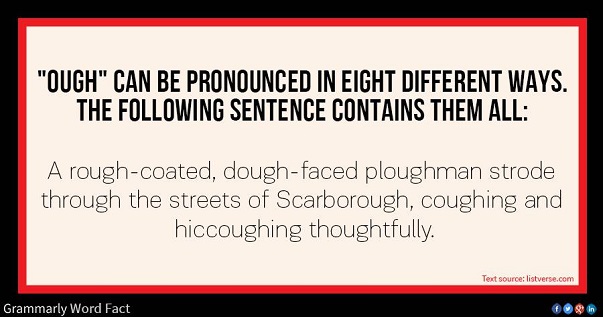
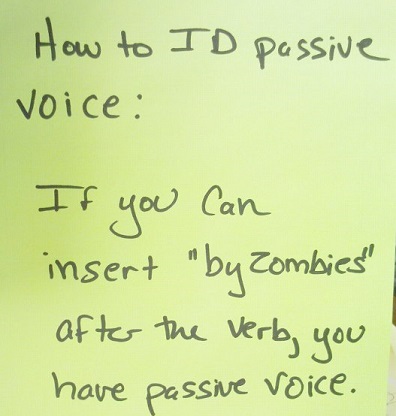
If it's not passive voice: "His brains were eaten by
zombies.",
then it's active voice: "Zombies ate his brains."
Phrasal Verbs By American English at State has 29 different graphics, each explaining different verb phrases ("phrasal verbs"). Examples are take:after, up, off, in, down, out; and put:away, up with, away. All 39 are at this link.
Plural Girls another classic from Funbrain! "Twin sisters Pearl and Flora lost their friends in the bubble machine. Help them get their friends out by choosing the correct plural form of the given word."
Do not confuse "popular" with "poplar" which is a family
of trees. We don't care
if some authors and other writers are spelling "popular" as "poplar";
poplars are trees!
Our suggestion: they should get a better spell checker.
"Genus Populus
Populus is a genus of 25–35 species of deciduous flowering plants in the
family Salicaceae,
native to most of the Northern Hemisphere. English names variously applied to
different
species include poplar, aspen,
and cottonwood."
English translation: Poplars have flowers, they drop their leaves in the fall,
and bud out new leaves
the next spring; they are related to willows. Poplars live world-wide north
of the equator.
Big Cottonwood trees along stream beds in the Midwest and West of Canada and
the US are
a giant poplar. Other large poplars live in what is left of the forests of Eastern
North
America. The aspen trees of the Rocky Mountains are poplars. If you see a grove
of aspen all
crowded together, you are seeing a clone! It's one giant plant colony with lots
of trees
sharing one root system! They are all one plant.
Something all poplars have in common are those trembling leaves everyone loves.
There are
beautiful videos of whole mountainsides covered with yellow-golden aspen, all
trembling in the wind.
Another thing they have in common is soft wood.
"Poplar" boards are from Tulip
Poplars (Liriodendron tulipifera) which are no relation.
If you want hard wood, get a Maple (Genus Acer), or an Oak (Genus Quercus).
Quotation Marks Quiz from Softschools. Check your knowledge of the proper use of quotation marks here, with this 10 question online quiz. Use the results to check your score.
Rooting Out Words from FunBrain. "Help Remainder the Dog gather enough mushrooms to sell at the market by uncovering the roots of words." Eleven tutorials and quizzes to help understand and find root words. Friendly but students still must do the work, and learn thereby.
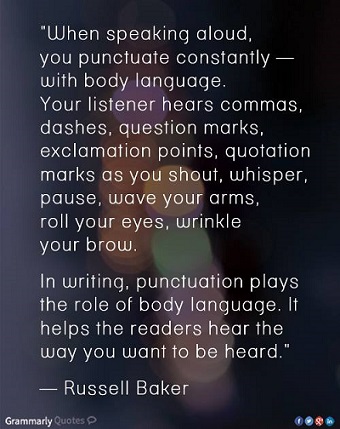
 Schoolhouse
Rock Nouns (A Noun is a Person, Place, or Thing)
Schoolhouse
Rock Nouns (A Noun is a Person, Place, or Thing)
One of the best Schoolhouse Rock videos. Completely explains nouns.
Getting a little dated (1970s) but the facts are still true. Catchy tune, too.
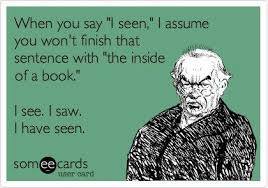
Semicolon Wars – A Punctuation Game for Kids from Mr. Nussbaum. Help the Semicolons conquer Punctuation Island by defeating the Commas, the Periods, and the Colons. "Lead the semicolons to stirring victories over their neighbors by using semicolons, periods, commas, and colons correctly by blasting them into their correct places in the sentences that appear! If you succeed, you can print out your semicolon supreme ruler certificate." Animated, interactive, loud, kids will love it.
Sentence Diagram Enparser This will automatically diagram a sentence for you, should you need that done. Provides insight into sentence structure.
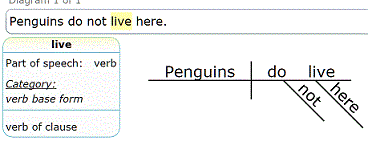
Similes and metaphors (actual title = Rhetorical Devices for Dummies: Making Comparisons) from Grammarly. This is a concise and succinct explanation of the difference. Good examples you'll remember, too! As most upper elementary kids could tell you, similes use "like" or "as". Metaphors don't. "Similes are like metaphors!" (That's a legitimate simile, btw.)
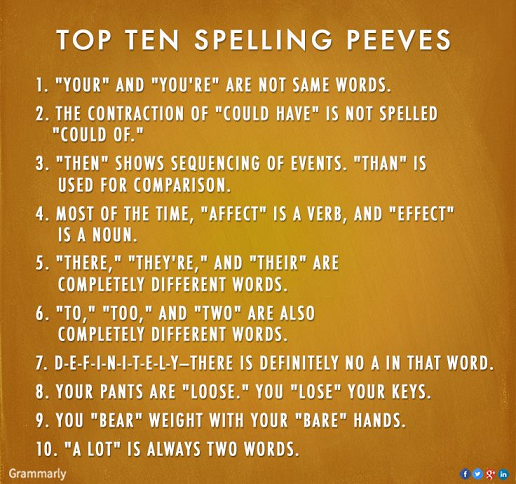
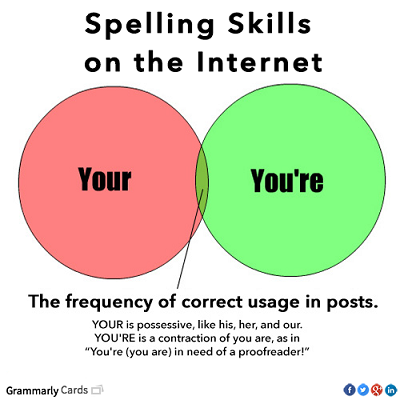
SpellingCity Popular in our local elementary schools. This very impressive site lets anyone type in spelling words and be tested on them. Type in anywhere from five to 15 words. The test says the words and/or uses each word in a sentence. There's a nice certificate to print out, too. The batch entry option lets you enter long lists of words copied from a word processor. Kids can use this site for free, adults are urged to sign up. We like it.
Spelling it Right - Learn How to Spell Confidently. (new url) "Free printable worksheets, help and advice from an experienced English teacher and examiner. This site is for: parents who are concerned about their children's spelling and are keen to help them improve; adults who find spelling difficult and want to learn to spell correctly; teachers who need some online printable spelling worksheets to supplement their own materials; and includes: advice about how to deal with problems and become a better speller; a collection of free printable worksheets, each comprising a complete lesson designed to test and teach spelling skills; games, puzzles and quizzes to help encourage an interest in spelling." OK, so Americans will have to drop a "u" once in a while; this is an excellent site that does what it says. Great syllable and consonant blend practice(!) and some good advice on teaching spelling. We want to thank Roger Smith for his site!
Starship English KS-1 level English games from the BBC. Covers homonyms, synonyms, sentence structure, syllables, irregular verbs, spelling, and more! Our fave so far is Story Plant, a scaffolding game, where kids string together sentences to make a story, with a cartoon helper who gives tips and explains concepts such as the "W"s of Who, When, Where, Why, and What.
This graphic explains the usage of tenses in English.
All your tenses are on display in one place, using the verb, "to cut".

Are there, their, and they're driving you nuts? Here are three sites to help your students use these homonyms like a boss!
How about: "They're over there in their house!" for a mnemonic help?
They're/their/there from Better English Lessons (which has many other activities besides this one). This is an online drill of 20 questions. No guidance included, but it would make a good checkup.
Using They're, Their, and There from the Wisconsin Technical College System. This is a Flash presentation (similar to a ppt) that covers the rules and gives examples of proper usage. It ends in a 20 question test that's forgiving and has a printable certificate at the end. This would work well with a projector.
Its/It's and There/Their/They're is a 10 question online quiz with rules of usage included. Part of a larger site that all seems to be offline(?)
Brainpop has a movie about the above, but you must be a member to view it.
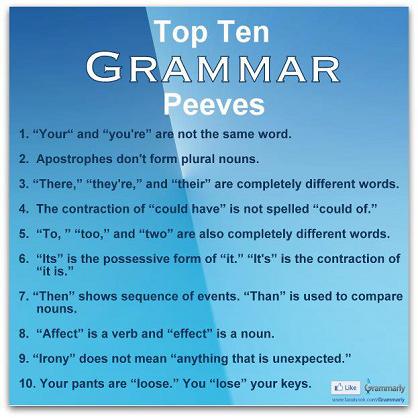 From
the Grammarly page on Facebook. Peeve #2 is aimed at people who think you need
an apostrophe to make a noun plural. Example: cat's
means "something that belongs to a/the cat." The noun that follows
"cat's" belongs to the cat.* It does NOT mean "more than one
cat." That's what "cats" means.
From
the Grammarly page on Facebook. Peeve #2 is aimed at people who think you need
an apostrophe to make a noun plural. Example: cat's
means "something that belongs to a/the cat." The noun that follows
"cat's" belongs to the cat.* It does NOT mean "more than one
cat." That's what "cats" means.
*But if the apostrophe is being used in a contraction, "cat's" would mean "cat is". As in "The cat's back." (The cat is back.) hmmmm.. what about "Scratch the cat's back." (The back belonging to the cat.)
 Two
= 2 Two people, two hundred, one two three
Two
= 2 Two people, two hundred, one two three
To = used as part of an infinitive
[to go] [to fly] [to dream]
To = going somewhere or
position [go to town] [go to class][left to right][to the right
of that tree]
Too = more than what's desirable
or permissible [too fast] [too much] [too bright]
Too = also [I'm going, too.]
What
are conjunctions and how should I use them? And, but, and or, and what they
do.
Sort of recapitulates the old Schoolhouse Rock video.
WHO's VS WHOSE
* "wisdom's" = "wisdom is" (this time) and could mean "belonging to wisdom" (NOT this time)
"Whose" = possessive of who. "Who's" = "who is", just as "it's" = "it is"
"Whose car is this? Who's the person that left the car door open?"
A perfect example on how to use the two words correctly without hesitation - Erica Zumba
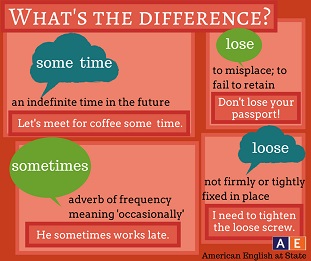
The WriteAtHome Blog The goal of this blog is help young adults learn to write better. This blog has several dozen tips on the proper use of various literary devices, such as figures of speech. "100 Ways to Say 'Bad' " is one of three entries designed to broaden vocabulary while teaching about shades of meaning. Check these out and go through the rest of the blog entries as well. Their commercial site, Write At Home.com, is aimed at homeschoolers ("We teach writing so you don't have to!"). It looks like it could do the job. Anyway, the three entries:
ZZCad Sentence Parsing Program "Type a sentence in the box below, and click on the button to see its parse." This will automatically break down a sentence into component parts and subsections, and show how they relate to each other. Parsing lets you choose words and word order, to convey shades of meaning. Parsing is a skill that can be learned.
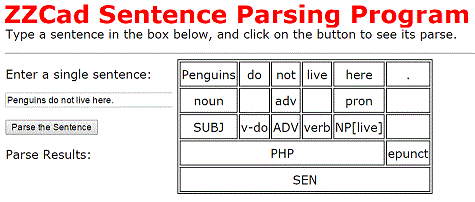
![]() to top of page
to top of page ![]()
![]() to Good Sites
to Good Sites![]()
![]() to Literacy
to Literacy
Powered
by ![]() The World's #1 Web Host
The World's #1 Web Host